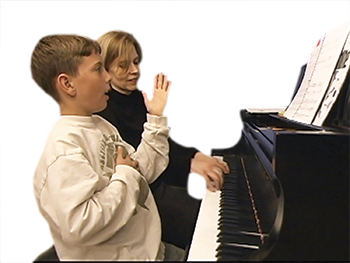Perhaps the favorite application of music theory in piano instruction is the teaching of I, IV and V7 chords in that familiar cluster surrounding the root-position I chord. This aspect of piano pedagogy is a guiding concept for Level 2B of Piano Adventures® and the corresponding ChordTime® Piano series. This…
As pianist and educator, Randall Faber has appeared as special guest at universities throughout North America and Asia, including the Beijing Central Conservatory, the Shanghai Conservatory and the Royal Conservatory of Canada. He has been Convention Artist for the Music Teachers National Association Conference and master teacher for the World Conference on Piano Pedagogy, National Conference on Keyboard Pedagogy, the Australasian Piano Pedagogy Conference and the USA National Piano Teachers Institute.
A Steinway Artist, Faber has given recitals throughout the United States, Canada and Asia. He has appeared on international television and on public radio in live recital broadcast.
Dr. Faber holds three degrees from the University of Michigan and a Ph.D. in Education and Human Development from Vanderbilt University. His research on motivation and talent development has been featured in journals and media in South Korea, China, Australia, and at the 9th International Conference on Motivation in Lisbon, Portugal.
Randall and his wife Nancy are well known as authors of the best-selling Piano Adventures® teaching method. Translated to seven languages, their books have sold tens of millions of copies around the world.
The Fabers are co-founders of the Faber Piano Institute.

At Level 3B, we appealed to the student’s interest in fast playing. At Level 4 the student learns lyric playing—the ability to project and beautifully shape a melody. We positioned lyric playing after fast playing because it requires more mature expression. We like to discuss the excitement of speed and…

Have you been uneasily watching students get their dopamine fix from beeps and tweets of social media? Ah, valuable time that could be for piano practice! Yes, we’re quite convinced of this, yet we’re lured by an anxious feeling that we’re missing the latest technology for teaching. Don’t be dismayed…and…





